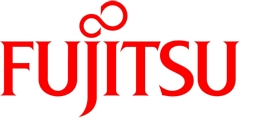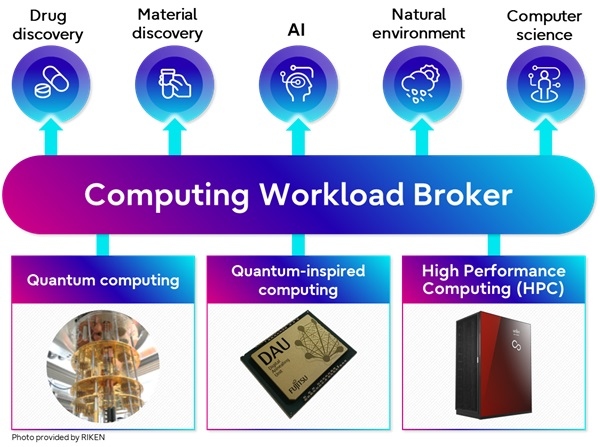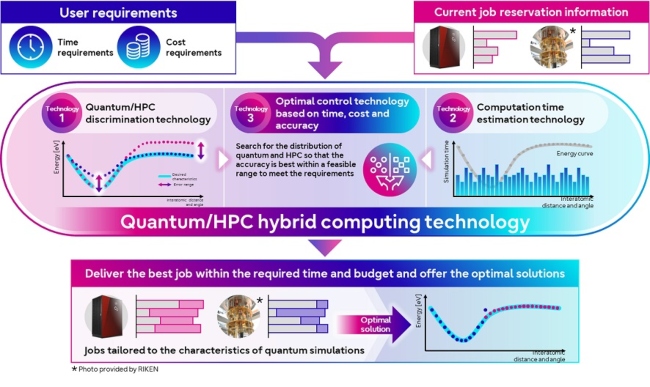
TOKYO, Nov 8, 2022 - (JCN Newswire) - Fujitsu today announced the development of quantum/HPC hybrid computing technology to optimize workload selection for customers. The new AI-based software, which serves as a precursor to a future computer workload broker technology, automatically selects from different next-generation computing platforms(1) to offer the optimal solution to customers' problems based on parameters including calculation time, calculation accuracy, and costs.
 |
 |
 |
The new technology leverages the power of Fujitsu's world top-class 39-qubit quantum simulator and the "FUJITSU Supercomputer PRIMEHPC FX 700," equipped with the same A64FX CPU that powers supercomputer Fugaku, combining and selecting the optimum calculation method for customers' quantum chemical calculation (2) problems. Crucially, the technology allows users without specialized knowledge to use quantum simulators and HPC technology to provide effective solutions to real-world problems.
World-leading advanced computing technologies for solutions to 21st century problems
Fujitsu has a long track record in developing and providing world-leading computing technologies, exemplified by its development and efforts to commercialize the supercomputer Fugaku, next-generation quantum computing, as well as technologies that bridge the gap between conventional and quantum, like the Digital Annealer and quantum simulators.
To promote the practical development of new quantum algorithms, Fujitsu announced the world's fastest quantum simulator in March 2022, initiating joint research in the field of materials science with Fujifilm Corporation(3) and Tokyo Electron Ltd.(4).
Easy access to next-generation computing technologies for non-computing experts
Fujitsu is currently working to develop a computing workload broker--a software technology that uses AI to automatically select the appropriate resources from advanced computing technologies and solutions, including large-scale cloud-based HPC, quantum computing, Digital Annealer, as well as quantum simulators to solve customers' complex problems.
Fujitsu envisions the future computing workload broker as supporting both the automation and the optimization of calculation processing of multiple hardware devices and the optimization of calculation distribution for different platforms. In this way, the computing workload broker will enable high-speed calculations and solutions according to customers' specific needs.
Outline quantum /HPC hybrid computing technology
To realize its vision for the computing workload broker, Fujitsu has now developed a quantum/HPC hybrid calculation technology for solving quantum chemical problems to enable calculation-based clarification of the properties of materials used in drug discovery and new material development. The new technology, which serves as a precursor to the computing workload broker, enables high precision calculations at high speed by automatically and optimally combining two types of computers: a quantum simulator and HPC. The features of the new technology are as follows.
1. Quantum/HPC algorithm discrimination technology
Algorithms used in quantum chemical calculations require repeated calculations until a highly accurate solution is obtained. As the distance between atoms changes, determining whether quantum or HPC algorithms offer the optimal solution to a problem represents a difficult challenge for existing technologies. To this end, Fujitsu developed a solution to determine the accurate algorithm for a problem by analyzing how the algorithm converges on molecules. For problems where classical algorithms do not deliver sufficient results, the technology detects a specific pattern in the convergence state until the algorithm calculates a solution, so that the optimum algorithm can be determined by performing pre-processing on the problem experimentally using HPC algorithms.
2. Computation time estimation technology
Accurate estimation of the convergence of the various molecular structures represented a complex task in quantum chemical calculations, and it proved difficult to estimate the time and cost required to obtain highly accurate solutions in advance. To address this issue, Fujitsu constructed an AI model able to estimate calculation amounts, costs and time in advance by utilizing an adaptive AI technology developed by Fujitsu to analyze the relationship between the molecular structure, the iterative calculation of the algorithm and the calculation time.
3. Optimal control technology based on time, cost and accuracy
In order to enable customers to perform calculations at optimal costs and in optimal time, Fujitsu developed a technology that optimizes the performance of quantum chemical calculations. The technology takes into account both the calculation time and cost estimated by the quantum/HPC algorithm discrimination technology and the computation time estimation technology as well as the usage of calculation resources. In this way, the technology enables users to solve quantum chemical calculation problems in a way that best meets their needs without the need to choose from different computational resources themselves.
Future Plans
Moving forward, Fujitsu will verify the effectiveness of this technology and further develop it, with the aim of establishing a new computing workload broker technology in the field of quantum chemical calculations by fiscal 2023. Fujitsu will further continue to develop computing platforms that can be used by anyone without the need for expertise by adding services to Fujitsu Computing as a Service (hereinafter "CaaS"), Fujitsu's service portfolio to deliver customers access to world-leading computing technologies via the public cloud.
(1) The technology interfaces with high-performance computing (hereinafter HPC) technologies including the following
Supercomputer Fugaku :
A computer installed at RIKEN as a successor to the K computer. From June 2020 to November 2021, it ranked first in 4 categories in the supercomputer rankings for 4 consecutive terms. Full operation started on March 9, 2021.
Quantum inspired technology :
A number of acceleration technologies inspired by quantum technology, but not quantum effects. This includes Fujitsu's Digital Annealer technology for solving complex combinatorial optimization problems.
(2) Quantum chemical calculation :
A technology field to analyze the properties and structure of molecules by simulating the interaction of electrons and atoms.
(3) Fujifilm Corporation :
Headquarters: Minato-ku, Tokyo, Japan; President and CEO: Teiichi Goto
(4) Tokyo Electron Ltd. :
Headquarters: Minato-ku, Tokyo, Japan; Representative Director, President & CEO: Toshiki Kawai
About Fujitsu
Fujitsu's purpose is to make the world more sustainable by building trust in society through innovation. As the digital transformation partner of choice for customers in over 100 countries, our 124,000 employees work to resolve some of the greatest challenges facing humanity. Our range of services and solutions draw on five key technologies: Computing, Networks, AI, Data & Security, and Converging Technologies, which we bring together to deliver sustainability transformation. Fujitsu Limited (TSE:6702) reported consolidated revenues of 3.6 trillion yen (US$32 billion) for the fiscal year ended March 31, 2022 and remains the top digital services company in Japan by market share. Find out more: www.fujitsu.com.
Copyright 2022 JCN Newswire. All rights reserved. www.jcnnewswire.com





